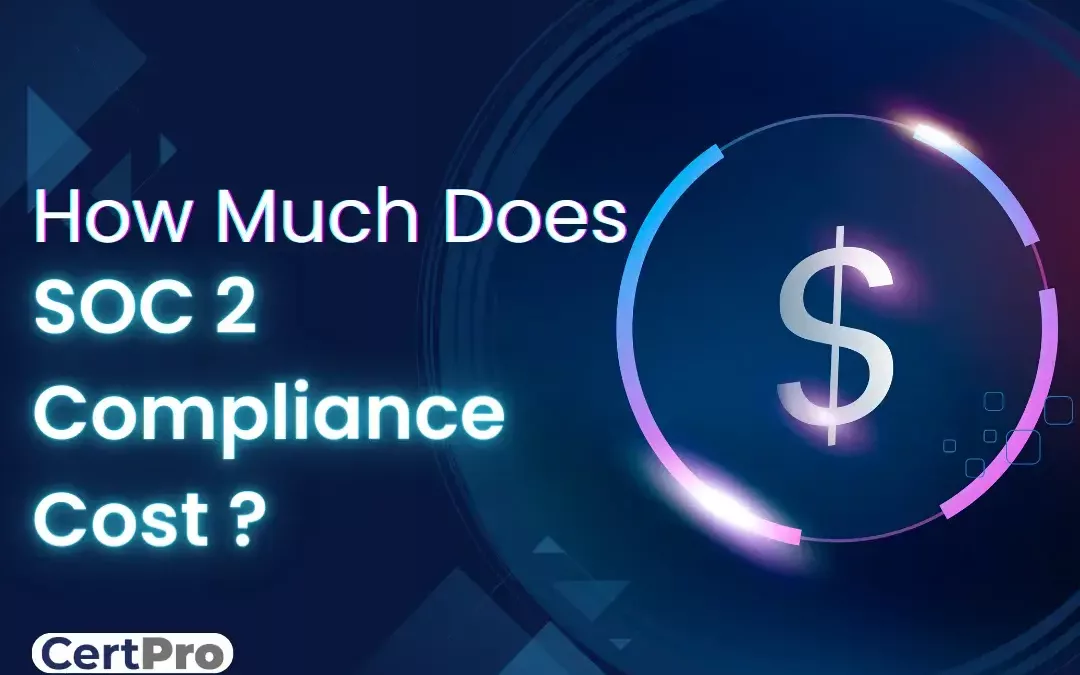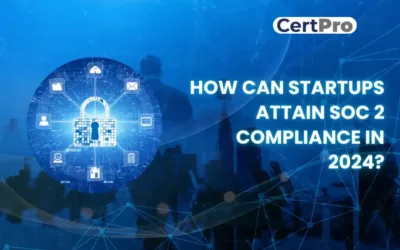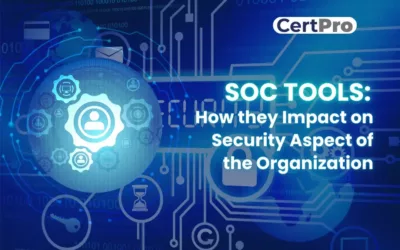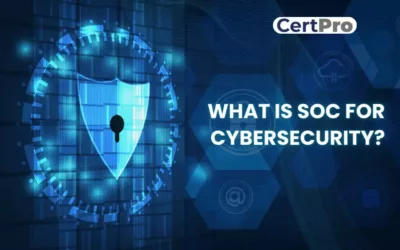As organizations continue to handle sensitive information and data, the importance of maintaining information security and regulatory compliance has become increasingly critical. SOC 2 compliance is one of the essential regulatory frameworks that help companies demonstrate their commitment to information security and data privacy. The American Institute of Certified Public Accountants (AICPA) developed SOC 2 as a well-known auditing standard to evaluate and report on an organization’s controls over the security, availability, processing integrity, confidentiality, and privacy of their information. However, as with any compliance framework, SOC 2 compliance can come at a cost, including SOC 2 costs. In this article, we will discuss the cost of SOC 2 compliance in 2024, including factors that impact the cost and considerations that organizations should keep in mind when budgeting for SOC 2 compliance.
Let’s dive into a few more pieces of information regarding SOC 2 compliance:
WHAT IS SOC 2 COMPLIANCE?
A system called SOC 2 (Service Organization Control 2) is used to assess how well a company’s security and data protection controls are working. The American Institute of Certified Public Accountants (AICPA) created it as a benchmark for assessing the security, accessibility, processing integrity, confidentiality, and privacy of sensitive data stored by service providers.
Customers or prospective clients who want confirmation that their data will be protected and handled properly frequently request SOC 2 reports. CPAs do SOC 2 audits to determine whether a company has put in place and is using the appropriate safeguards to satisfy the AICPA’s Trust Services Criteria.
The design of a company’s controls is evaluated in SOC 2 Type 1 reports, while the effectiveness of those controls over time is evaluated in SOC 2 Type 2 reports. As more businesses rely on cloud-based service providers to store and handle their sensitive data, SOC 2 compliance has grown in importance.
WHO SHOULD COMPLY WITH SOC 2?
Any business that offers services that require the transmission, processing, or storage of client data must take SOC 2 compliance into account. This comprises businesses across a variety of sectors, including cloud computing, finance, healthcare, and technology.
For service firms that manage sensitive client data, such as personally identifiable information (PII), protected health information (PHI), and financial data, SOC 2 compliance is especially crucial. Cloud service providers, SaaS businesses, data centers, and payment processors are a few examples of service corporations that could need to comply with SOC 2 standards.
Regulations like HIPAA, GDPR, or CCPA may also apply to organizations that handle sensitive data, requiring them to create and uphold efficient security and data protection policies. Organizations can achieve these legal standards with the aid of SOC 2 compliance, demonstrating to consumers and authorities alike their dedication to data security.
BENEFITS OF SOC 2 COMPLIANCE:
Organizations that establish and maintain efficient security and data protection procedures can profit from SOC 2 compliance in a number of ways. These advantages consist of:
- Being trustworthy: Trust among customers is boosted thanks to SOC 2 compliance, which shows clients and other stakeholders that a company has put in place suitable security and data protection measures.
- Competition advantage: Advantage over non-compliant businesses, As more consumers and potential clients look for service providers who can demonstrate their dedication to security and data protection, SOC 2 compliance can give compliant businesses an edge over non-compliant ones.
- Mitigating risks: Reputational harm, financial losses, and legal liabilities can come from data breaches and other security incidents, which can be prevented through SOC 2 compliance.
- Enhancing Internal Operations: Internal process improvements are possible as a result of the SOC 2 framework’s requirement that firms assess and document their security and data protection measures. This can result in better internal procedures and risk management techniques.
- Regulation compliance: SOC 2 compliance can assist firms in meeting the data protection obligations of many legislative frameworks, including HIPAA, GDPR, and CCPA.
- Better vendor management: SOC 2 compliance offers a benchmark for assessing the security and data protection policies of third-party service providers, assisting organizations in selecting the right contractors.
- Saving money: SOC 2 compliance can assist businesses in preventing costly data breaches and other security incidents that could expose them to heavy financial losses and legal ramifications.
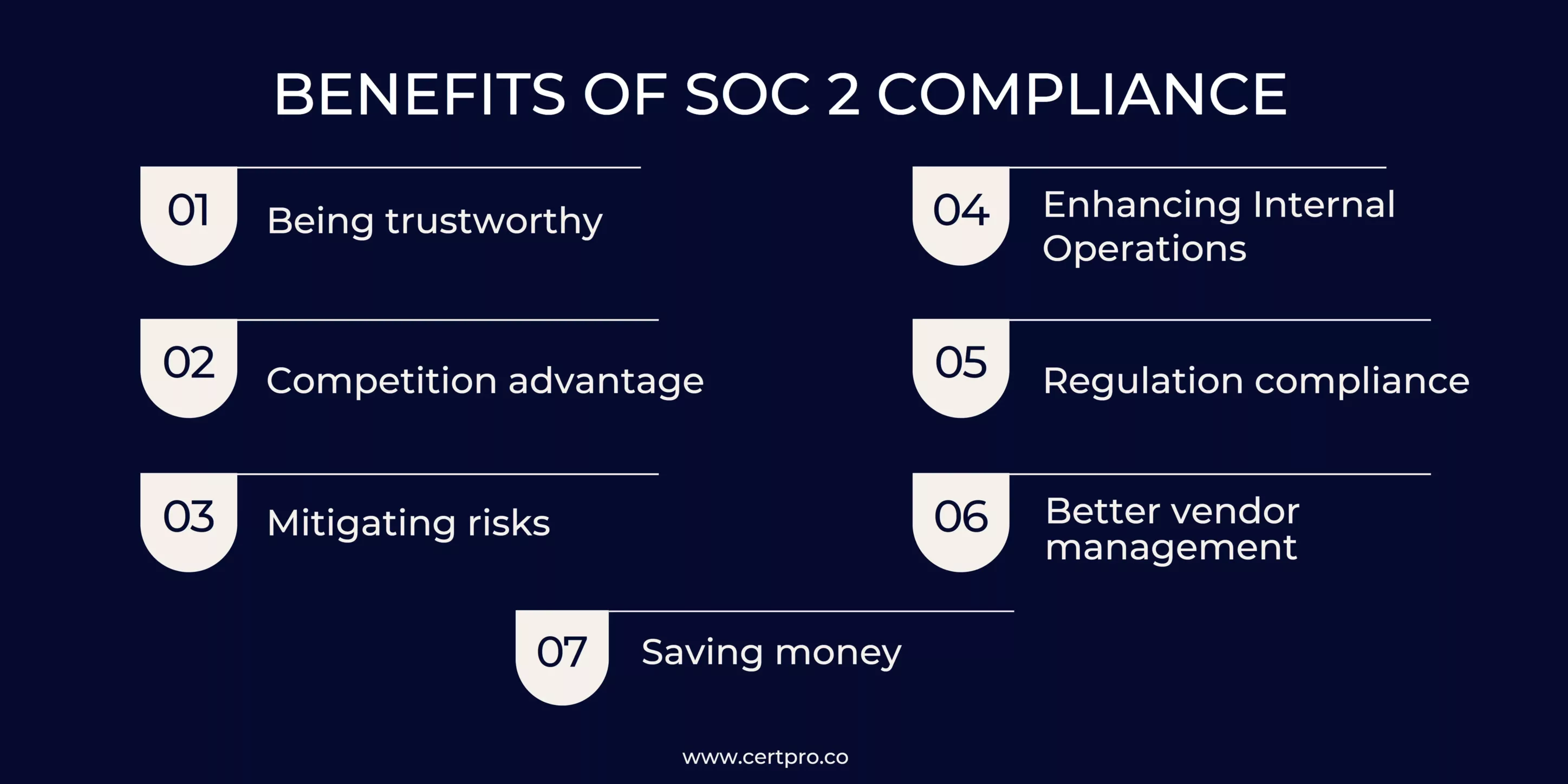
SOC 2 COMPLIANCE COST IN 2024
The SOC 2 certification cost for 2024 is difficult to predict with any degree of accuracy because it can vary greatly depending on a number of variables, such as the size and complexity of the organization, the scope of the audit, and the amount of work necessary to implement and maintain efficient security and data protection controls. This includes SOC2 costs as well.
The price of SOC 2 compliance should, however, stay largely consistent in 2024, with minor variance depending on the unique circumstances of each firm, according to current trends and industry projections. The average cost of a SOC 2 audit in 2020 was $29,400, according to a recent poll by the American Institute of Certified Public Accountants (AICPA), with expenses varying from $3,000 to $100,000 or more depending on the size and complexity of the business and the audit’s scope.
In addition to the audit fee and SOC 2 cost, organizations need to consider the ongoing expenses of establishing and sustaining efficient security and data protection policies, which may vary depending on the business’s size, sector, and risk profile. These expenditures could include the cost of hiring and training employees, implementing security technologies, and conducting periodic security audits and evaluations.
| No. of employees | Timeline | Cost (approx.) |
| 1 – 25 | 6 weeks | 4750 USD |
| 25-100 | 8 weeks | 6750 USD |
| 100-250 | 8-10 weeks | 9750 USD |
| 250 plus | 12 weeks | Custom plans |
| For SOC2 Type II audit attestation post Type I @ 3000 USD |
Additional expenses associated with SOC 2 Certification:
When an organization seeks SOC 2 certification, there are various additional expenditures that they may have to pay in addition to the fees for the Type 1 and Type 2 SOC 2 audits. These may consist of:
1. Legal expenses: Legal expenses: Many companies hire consultants to help them obtain SOC 2 certification. These consultants can aid in the audit process and offer guidance on developing and implementing effective security and data protection protocols. The cost of such consulting services may vary widely based on the consultant’s expertise, the size and intricacy of the company, and other factors. Typically, the cost could range from $8,000 to $11,000 for the organization.
2. Costs associated with internal resources: A large time and resource commitment is needed from an organization’s internal team in order to achieve and maintain SOC 2 compliance. To establish and execute efficient security procedures, this might involve hiring and training staff as well as regular monitoring and reporting tasks.
Staff awareness training typically costs $25 per user, but trainer expenses might reach $15,000 per training session, depending on the course’s quality and substance.
3. Costs associated with technology: To help organizations comply with SOC 2 criteria, they may need to invest in new technologies like security software or hardware. Depending on the organization’s present technological infrastructure and the precise SOC 2 audit requirements, these expenses might vary significantly.
4. Costs associated with remediation: If a company’s SOC 2 audit reveals flaws or areas of non-compliance, the organization will need to take action to fix the problems. Additional consultation expenses, internal resource expenditures, and technological costs may be incurred as a result.
Obtaining and maintaining SOC 2 compliance is a worthy investment in the security and data protection of an organization’s systems and data, and it is vital to keep this in mind.
The SOC 2 cost is anticipated to climb in 2024 as the need for cybersecurity services grows and the threat environment changes. However, working with a dependable service provider like CertPro can assist businesses in achieving and maintaining SOC 2 compliance in a time- and money-saving manner.
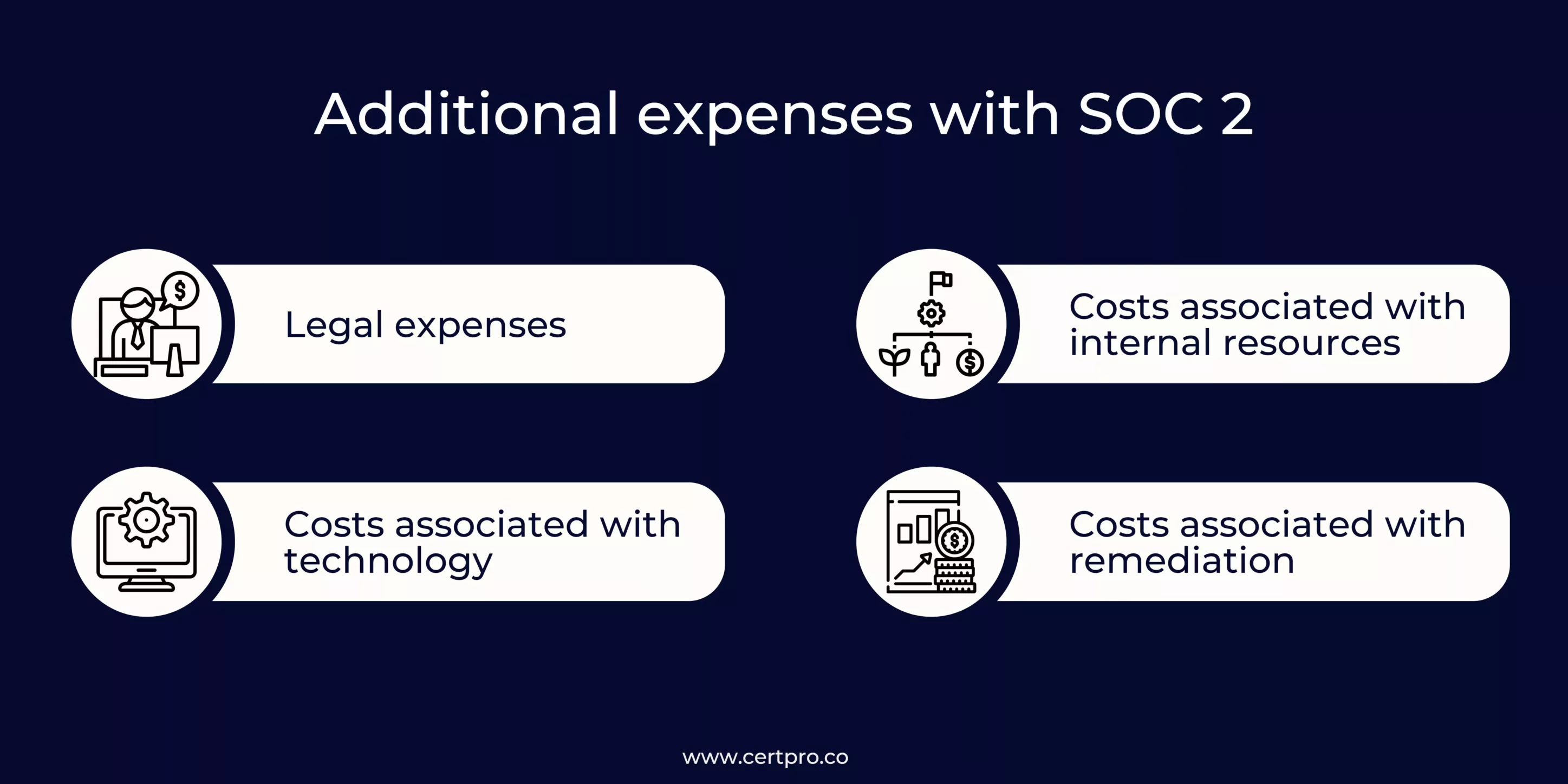
WHAT IS THE COST OF SOC 2 TYPE 1 & TYPE II COMPLIANCE?
The auditor conducts a thorough review of your organization’s policies, procedures, and controls as part of a SOC 2 Type 1 audit, ensuring their effectiveness in safeguarding consumer data. Factors such as your organization’s size, system and control complexity, audit preparedness status, and the chosen auditor play a decisive role in determining the associated costs for this process.
The initial costs for a SOC 2 Type 1 audit typically begin at $5,000, covering up to three Trust Service Criteria (TSCs). However, the expenses can escalate to $25,000 if the audit involves more than three TSCs. While cost considerations are crucial, it is equally important to select an auditor with proven qualifications and expertise in assessing organizations similar to yours. Achieving SOC 2 compliance not only demands attestation from a reputable CPA but also underscores the significance of maintaining a robust security posture and adhering to tailored best practices for your firm.
In the case of SOC 2 Type 2, the review period extends from 3 to 12 months, leading to slightly higher expenditures. The costs associated with obtaining SOC 2 compliance for Type 2 reports typically range between $7000 and $50000. Similar to Type 1 audits, various factors, including firm size, system and control intricacy, audit preparedness, chosen Trust Service Criteria (TSCs), and the auditor’s profile, actively influence these expenses. It’s essential to be mindful that these costs accumulate when factoring in readiness assessments and other overhead charges.
WHAT ARE THE OVERALL COSTS OF SOC 2 COMPLIANCE?
Achieving SOC 2 certification is expected to cost between $30,000 and $150,000 in 2024. Six essential factors impact the real costs associated with SOC 2 compliance:
Size of your Organization: The total SOC 2 certification cost is largely dependent on the size and reach of your company.
Complexity of your Operations: The variance in certification expenses might be attributed to the complexity of your operational procedures.
Maturity of your Security Controls: The cost of certification is directly impacted by the complexity and efficacy of your current security measures.
Number of in-scope Trust Service Criteria: The particular Trust Service Criteria (TSC) used for assessment has an impact on the total cost of certification.
Type of Report (Type 1 or Type 2): Choosing between a Type 1 or Type 2 report has an impact on certification prices; Type 2 reports often cost more because of the longer examination period.
Cost of your chosen auditor: The chosen auditor’s fees play a major role in the overall cost of certification.
FAQ
WHO NEEDS TO COMPLY WITH SOC 2 STANDARDS?
Companies that wait until a Series C will pay more than a seed firm to obtain a SOC 2 report. However, SOC 2 Type 1 and Type 2 implementation and audit costs alone average $80,000 for businesses with 50 employees.
How much does a SOC 2 audit cost?
In total, a SOC 2 audit typically costs between $5,000 and $60,000. However, you are ultimately paying for much more than just the auditor. One company, for instance, costs $20,000 for a SOC 2 Type I audit and $30,000 for a SOC 2 Type II audit. This company is AICPA-certified to undertake SOC 2 audits.
Who needs to comply with SOC 2 standards?
Any company that manages sensitive data or offers services to customers who demand high levels of data security should think about adhering to SOC 2 standards. This covers companies that offer services like cloud computing, software as a service (SaaS), and data center operators.
How may organizations reduce the expense of SOC 2 compliance?
Employing a reputable service provider, like CertPro, to assist an organization with SOC 2 compliance can help reduce the cost of compliance. Using current technology investments, carefully evaluating and prioritizing compliance needs, and performing internal reviews to find gaps and potential for improvement are some other options.
What size does SOC typically have?
These people are SOC managers, technical personnel, or technical managers. The organizations’ sizes ranged from less than 100 to more than 100,000, with 101–1,000 being the most typical range.

About the Author
GANESH S
Ganesh S, an expert in writing content on compliance, auditing, and cybersecurity, holds a Bachelor of Arts (BA) in Journalism and Mass Communication. With a keen eye for detail and a knack for clear communication, Ganesh excels in producing informative and engaging content in the fields of compliance, auditing, and cybersecurity, with particular expertise in ISO 27001, GDPR, SOC 2, HIPAA, and CE Mark.
HOW CAN STARTUPS ATTAIN SOC 2 COMPLIANCE IN 2024?
Trust is crucial for startups to do well in today's digital world. It's vital for establishing credibility with clients, especially in a data-driven environment where privacy is the main component. Therefore, getting a SOC 2 compliance report is crucial to building...
SOC TOOLS: How They Impact On Security Aspect Of The Organization
The changing cybersecurity landscape increases the importance of Security Operations Center (SOC) tools. Hence, it is essential for strengthening digital defenses and protecting against cyberattacks. SOC tools help security teams detect, monitor, and prevent security...
WHAT IS SOC FOR CYBERSECURITY?
In today's fast-paced digital landscape, ensuring robust cybersecurity measures is imperative for organizations aiming to protect sensitive data and maintain stakeholder trust. The American Institute of CPAs (AICPA) crafted the SOC for cybersecurity reporting...

